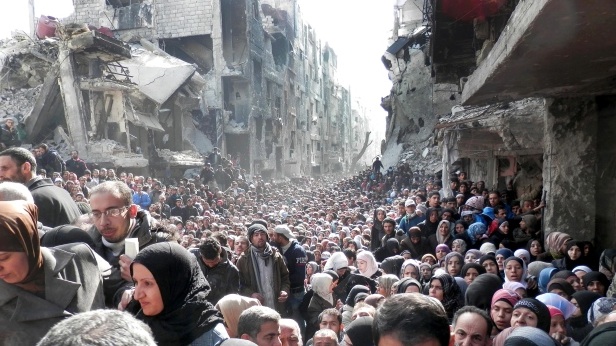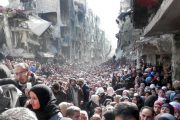The Biggest Mistake Caring Australians are Making in Response to the Syrian Crisis

Image source
On Sunday, while Aussie Dads were celebrated for the important role they play in our kids’ lives, Abdullah Al-Kurdi mourned another day without his sons Aylan and Galip and wife Rehan.
We all know that image of Aylan’s body washed ashore.
Here’s what Aylan should look like.
It is heartbreaking.
Much of the online commentary has been heartwarming.
Sadly, as always, many comments have been vulgar.
Comments like “Why don’t these people just go back to where they came from”.
Yup, there’s just no place like home, is there?
“They should go through the proper channels to seek asylum”. Of course, that’s it! Just wait in the rubble while ISIS beheads everyone in your street. Fingers crossed you don’t get your application denied.
Then there’s “The image of Aylan is staged – It’s all fake – the boy’s body was moved” Oh my God. Really? Sounds more like a cover for “I’m not giving anything of MINE to these people.”
And “Abdullah Al-Kurdi was only trying to get to Canada for dental care”. I did read his teeth were pulled out in torture, so it’s possible he might have wanted to chew properly again but I sincerely doubt that was his main reason for endangering his children’s lives.
I don’t know the full story of the Kurdis. I don’t think anyone really does. Does it really matter? A post on Mike Baird’s Facebook page about the deaths turned into an argument about Muslims just wanting sex slaves, for crying out loud!
If these are the arguments you reached for after seeing those images, then please stop reading – this article isn’t for you. If the dead, bloated body of a child washed up on a beach inspires hateful, unhelpful comments about ‘border protection’ and ‘not changing the way you live’ then nothing I can say will persuade you otherwise.
If, however, those images broke your heart, made you see how lucky you are and made you desperate for a better world. If it made you crave a better legacy for your children, then I’m talking to you.
The biggest humanitarian emergency of our time: What’s actually going on in Syria?
I visited Syria during a 6-week journey through the Middle East around 15 years ago. The country was spectacular: the desert topography, culture and historical buildings were incredible. I particularly enjoyed visiting the ancient Roman ruins in the city of Palmyra. This is my memory of Palmyra:
Here is an image of Palmyra posted last month:
In my experience, the people of Syria had little but gave a lot. They were quick to offer themselves as free tour guides (they just wanted someone to practice English with) and I was humbled by their generosity.
I’m embarrassed to say, like many, I’ve been spectacularly apathetic to the Syrian civil war / ISIS atrocities over the past few years.
If you’re a little sketchy on the details (it’s ok, you’re not alone), here’s a 5-second update:
- Since 2011 Syria has been engulfed in civil war –this comic sketch illustrates well how the horrific key events unfolded.
- In 2014, ISIS militants began seizing regions in Syria and Iraq, overthrowing occupants with violence and terror. Looting and beheadings have become their signature activity.
- There are currently 11 million people displaced as a result of the civil war and ISIS activity in Syria. That’s 11 million people that cannot live in their homes.
- More than 2500 people (from Syria and other nations) have died trying to make it to Europe in overcrowded boats, desperate for better lives.
- The US, which currently has a military presence in Syria is asking Australia, as part of an international effort to defeat IS, to become involved in airstrikes – a decision that it looks like will take place this week.
Whatever the details around Aylan, Galip and Rehan’s deaths. Whatever our feelings on border control and immigration, perhaps we can agree on two things:
- Syrians, and other refugees from war-torn countries, are desperate people fleeing situations we can’t even imagine. They are parents, children, and mothers, like us, except they’re not stressed about school drop-off. They’re trying to stay alive.
- We are so bloody lucky to be living in a first world country. Don’t we owe it to give something back to those who are fighting for their lives? Their children’s lives?
Our greatest mistake in response to Syria
So with the images and knowledge that has been thrust into our forefront over the past few days, there is one big mistake that caring Australians are choosing to make.
They’re choosing apathy. They’re choosing inaction. They feel helpless and don’t know how they can possibly make a difference to this global problem, so they’re looking away.
It’s a choice that bears tragic consequences. And it’s not true. You can help. You can do a lot.
Just don’t choose apathy. Whatever you do, just do something.
Remember, these people would choose to live in their homelands if they could. It’s just not safe for them to do so.
The ways you can choose to help are many, and growing. You can:
- Provide financial aid through a number of charities like Red Cross, Caritas, The UN Refugee Agency, Save the Children, CARE Australia, World Vision, Doctors of the World, Oxfam or Doctors Without Borders
- Sign petitions like this one asking for an increase in Australia’s Syrian refugee intake
- Donate much needed items goods like sleeping bags, bin liners, storage boxes on the Amazon Help Calais and Beyond Wishlist.
- Write to your local politician voicing your point of view, showing you care.
- Attend an event – protest the current inaction, show you care and find out new ways to help. #Lightthedark Australia Says Welcome is holding events from today (7 Sept) in Sydney, Melbourne, Adelaide, Perth, Hobart, Darwin, Canberra and Brisbane. Full details here
- Join forces with online movements and make a positive difference. Check out this list of things you can do from Mums 4 Refugees
- At the very least Watch this short video
Whatever your view on stopping the boats or border control, we can each do what feels right for us and help Syrian refugees. Remember, if you do nothing that’s still a choice.
As far as the Australian Government goes it’s embarrassing. And the world is noticing. On September 3rd, The New York Times published an article called “Australia’s Brutal Treatment of Migrants” calling our border control policies “inhumane, of dubious legality and strikingly at odds with the country’s tradition of welcoming people fleeing persecution and war”.
Today, it’s being reported that Tony Abbott has agreed to increase the proportion of asylum seekers from Syria and Iraq but refuses to increase the quota (currently 13,750). What a guy. <We note that since this article was published, The Australian Government has announced it will resettle an additional 12,000 Syrian refugees this year, so thanks Tony. At the same time airstrikes against ISIS targets will begin this week>.
Who knows what Syria will look like after airstrikes. Will it help or make a bad problem worse? Can we really still turn people away when we’re the ones dropping the bombs?
I don’t have all the answers, but I know we can choose to do much better.
Do you know any other ways to help Syrian refugees? We’d love to know about them. Please feel free to post them at the bottom of this article.

![aylan-kurdi-1[4]](https://www.mumslounge.com.au/wp-content/uploads/2015/09/aylan-kurdi-14.jpg)
![Syria1[3]](https://www.mumslounge.com.au/wp-content/uploads/2015/09/Syria13.png)
![Palmyra1[3]](https://www.mumslounge.com.au/wp-content/uploads/2015/09/Palmyra13.jpg)
![Palmyra2[1]](https://www.mumslounge.com.au/wp-content/uploads/2015/09/Palmyra21-1024x683.jpg)









